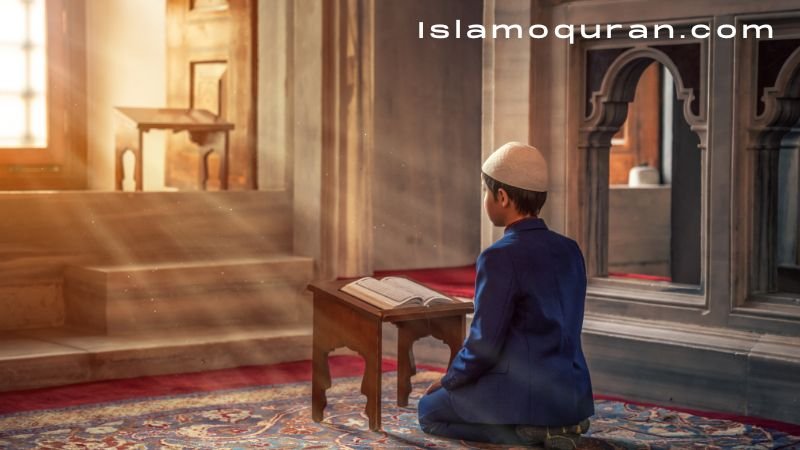Table of Contents
Prophets in Islam are extraordinary human beings selected by Allah to convey His divine message to humanity. Their primary mission was to preach the fundamental and universal message of monotheism: the belief in one God.
Despite their human nature, they were endowed with the responsibility of guiding their communities towards moral and spiritual reformation. This was accomplished through the divine commands and regulations they received from Allah, which were designed to ensure that people conducted themselves with integrity and righteousness.
The influence of the prophets extended beyond mere guidance; they played a crucial role in the moral and ethical upliftment of their societies. Through their teachings and exemplary lives, they aimed to purify the souls of individuals and foster a sense of moral consciousness.
This spiritual and moral growth was vital not only for the honor and dignity of individuals in this worldly life but also for their salvation and reward in the hereafter. The teachings of the prophets served as a protective barrier against evil deeds and immoral behavior, guiding their followers towards a path of righteousness and piety.
For Muslims, having faith in all the prophets chosen by Allah is a fundamental aspect of their belief system. This faith entails acknowledging that the prophets delivered God’s message with utmost sincerity and integrity, without any alteration, concealment, or corruption.
The integrity of the prophets in conveying the divine message is paramount; hence, rejecting a prophet is equivalent to rejecting Allah Himself, who chose the prophet for this sacred task. Similarly, disobeying a prophet is seen as disobedience to Allah, who issued the commands through His prophets.
Allah, in His infinite wisdom and mercy, sent prophets to every nation across the world. These prophets were often from the same community or nation they were sent to, which facilitated better communication and understanding of the divine message. They preached the core tenet of Islam: the worship of Allah alone. This message was universal and unchanging, urging people to abandon the worship of false gods and idols and to turn their hearts and lives towards the one true God.
The prophets’ mission was not just about delivering a set of religious instructions but was deeply intertwined with the social, moral, and spiritual well-being of their communities. They addressed various aspects of life, providing guidance on how to live in harmony with the divine will and with each other.
Their teachings encompassed aspects of justice, compassion, honesty, and piety, ensuring that their followers led balanced and fulfilling lives that aligned with the principles laid down by Allah.
Why Should You Believe In All The Prophets?
Muslims are required to have faith in all the prophets chosen by Allah. This belief is fundamental as it underscores the integrity and unaltered delivery of Allah’s message. Rejecting any prophet is equivalent to rejecting Allah, as the prophets are His chosen messengers. Disobeying a prophet is seen as disobedience to Allah. Every nation received a prophet, and most prophets were sent from within those nations to ensure the message was culturally and linguistically accessible. The core message of all prophets was to worship Allah alone and to renounce any false deities.
“And We certainly sent into every nation a messenger, [saying], ‘Worship Allah and avoid Taghut.’ Among them were those whom Allah guided, and among them were those upon whom error was [deservedly] decreed” (Quran, 16:36).

The Role and Significance of Prophets
The role of prophets in Islam is one of profound significance. These individuals, chosen by Allah, were tasked with the monumental responsibility of conveying His divine message to humanity. Their primary mission was to guide people toward the worship of one true God, Allah, and to instill in them a sense of morality and righteousness. However, while prophets hold an esteemed position in Islam, it is crucial to maintain the proper perspective on their role and status.
Prophets, despite their elevated status as messengers of God, are still human beings. They were selected by Allah to deliver His message, to serve as examples of righteous living, and to lead their communities toward spiritual and moral purification.
This mission is encapsulated in their lives and teachings, which serve as blueprints for moral and ethical conduct. The Quran emphasizes that prophets are not to be equated with Allah or exalted to a divine status. Their revered position does not diminish their humanity, nor does it elevate them to the level of the Creator.
This distinction is underscored in the Quran, particularly in Surah Al-Imran:
“Muhammad(PBUH) is not but a messenger. [Other] messengers have passed on before him. So if he was to die or be killed, would you turn back on your heels [to unbelief]? And he who turns back on his heels will never harm Allah at all; but Allah will reward the grateful” (Quran, 3:144).
This verse serves as a reminder that prophets, including Prophet Muhammad, are mortal beings who fulfill their roles as conveyors of Allah’s message. Their deaths do not signify the end of the divine message or the need for continued faith and obedience to Allah.
Throughout history, prophets were sent to various nations to address the unique circumstances and challenges faced by those communities. Each prophet brought the same core message of monotheism, tailored to resonate with the specific cultural and societal contexts of their time.
However, Prophet Muhammad stands out as the final prophet, whose mission was universal. He was sent as a mercy to all of humanity, bringing with him the final and complete revelation, the Quran. This comprehensive guidance is meant for all people, across all times and places, reinforcing the universal nature of his prophethood.
Prophets served multiple roles: they were warners, educators, and exemplars. Although they were regular humans, their selection by Allah distinguished them as the conveyors of divine revelations. They received messages or books from Allah and were tasked with implementing these commands in their lives, thereby setting an example for their followers.
Prophets Mentioned in the Quran

- Musa (Moses) – 136 times
Prophet Musa is the most frequently mentioned prophet in the Quran. He received the Tawraat (Torah) and was sent to confront Pharaoh, a tyrant who considered himself a god. Musa’s story, filled with profound morals and divine lessons, transcends time and remains relevant in Islamic teachings. - Ibrahim (Abraham) – 69 times
Known as Khalil Allah (the friend of Allah), Ibrahim is revered for his unwavering monotheism and for building the Kaaba. He was given the Suhof (Scrolls) to guide his people towards the worship of one God. - Nuh (Noah) – 43 times
Prophet Nuh preached for an astonishing 950 years and faced relentless persecution. His perseverance is exemplified in the story of the Ark, which saved him and the believers from a devastating flood sent as punishment for the disbelievers. - Lut (Lot) – 27 times
Prophet Lut is known for his struggle against the immoral practices of his people and his unwavering commitment to Allah’s message. - Yusuf (Joseph) – 27 times
Prophet Yusuf’s story is one of the most detailed narratives in the Quran, highlighting themes of patience, faith, and divine justice. - Isa (Jesus) – 25 times
Isa, son of Maryam (Mary), was born without a father, a miracle in itself. Contrary to some beliefs, Isa is not the son of God but a prophet sent to guide people towards righteousness and monotheism. His life and miracles were meant to lead people to believe in Allah alone. - Adam – 25 times
The first human and prophet, Adam’s story in the Quran teaches about creation, human nature, and the importance of obedience to Allah. - Harun (Aaron) – 20 times
Prophet Harun supported his brother Musa in delivering Allah’s message to the Israelites. - Sulayman (Solomon) – 17 times
Known for his wisdom and powerful kingdom, Prophet Sulayman was also given the ability to communicate with animals and control the jinn. - Ishaq (Isaac) – 17 times
Prophet Ishaq was the son of Ibrahim and continued his father’s legacy of preaching monotheism. - Dawud (David) – 16 times
Prophet Dawud received the Zaboor (Psalms) and was blessed with profound knowledge and power. He was a devout worshipper and a just king. - Yaqub (Jacob) – 16 times
Known for his patience and trust in Allah, Prophet Yaqub faced numerous trials but remained steadfast in his faith. - Ismael (Ishmael) – 12 times
Prophet Ismael, the elder son of Ibrahim, played a significant role in the construction of the Kaaba and is revered for his obedience and dedication to Allah. - Shuayb – 11 times
Prophet Shuayb is noted for his efforts to correct the dishonest practices of his people and for his eloquence. - Salih – 9 times
Sent to the people of Thamud, Prophet Salih’s story emphasizes the consequences of rejecting divine signs. - Zakaria – 7 times
Prophet Zakaria was known for his piety and was blessed with a son, Yahya (John the Baptist), in his old age. - Hud – 7 times
Prophet Hud was sent to the people of ‘Ad, urging them to abandon idolatry and return to the worship of Allah. - Yahya (John the Baptist) – 5 times
Known for his devoutness and ascetic lifestyle, Prophet Yahya continued his father Zakaria’s mission. - Muhammad – 4 times
The final prophet, Muhammad (S.A.W.), known as the seal of the prophets, was sent to all of humanity. He was chosen to preach the message of monotheism and to be a mercy to the worlds. Despite being mentioned fewer times in the Quran, his significance is unparalleled. He was given the final divine book, the Holy Quran, which serves as a comprehensive guide for all aspects of life. His exemplary life continues to inspire and guide Muslims around the world. - Yunus (Jonah) – 4 times
Known for his story of repentance and deliverance from the belly of a whale, Prophet Yunus’s narrative highlights Allah’s mercy and forgiveness. - Ayyub (Job) – 4 times
Prophet Ayyub is renowned for his patience and unwavering faith in the face of immense suffering and hardship. - Idris (Enoch) – 2 times
Mentioned briefly, Prophet Idris is known for his wisdom and devotion to Allah. - Alyasa (Elisha) – 2 times
Prophet Alyasa continued the mission of his predecessor, Elijah, and is praised for his steadfastness. - Elyas (Elijah) – 2 times
Prophet Elyas is remembered for his efforts to turn his people away from Baal worship and back to Allah. - Thul Kifl (Ezekiel) – 2 times
Known for his righteousness and patience, Prophet Thul Kifl’s story is a reminder of the importance of perseverance in faith.
Respect and Reverence for Prophets
As Muslims, showing respect and reverence for prophets is a fundamental aspect of faith. This is not merely a matter of historical acknowledgment but a living practice that manifests in daily prayers and invocations. It is a duty of Muslims to send blessings and peace upon the prophets whenever their names are mentioned. This practice is highlighted in Surah Al-Ahzab:
“Indeed, Allah sends blessings upon the Prophet, and His angels [ask Him to do so]. O you who have believed, ask [Allah to send] blessings upon him and ask [Allah to grant him] peace” (Quran, 33:56).
This verse signifies the honor and respect that is due to Prophet Muhammad and, by extension, all prophets. It also underscores the continuity of divine favor and the importance of maintaining a connection with these revered figures through prayer and blessings.
While prophets in Islam are deeply respected and their teachings held in high esteem, it is crucial to remember their primary role as messengers of Allah. They are not to be idolized or equated with God but respected for their dedication to conveying His message. This respect is demonstrated through blessings and prayers, reinforcing the timeless relevance of their guidance. By honoring the prophets in this manner, Muslims reaffirm their commitment to the monotheistic faith and the moral and ethical principles that these noble figures exemplified.
“Muhammad is not but a messenger. [Other] messengers have passed on before him. So if he was to die or be killed, would you turn back on your heels [to unbelief]? And he who turns back on his heels will never harm Allah at all; but Allah will reward the grateful” (Quran, 3:144).

Most prophets were sent to specific nations, whereas Prophet Muhammad was sent to guide all of humanity. It is a duty of Muslims to send blessings and peace upon the prophets when mentioning their names.
“Indeed, Allah sends blessings upon the Prophet, and His angels [ask Him to do so]. O you who have believed, ask [Allah to send] blessings upon him and ask [Allah to grant him] peace” (Quran, 33:56).
Respect for Prophets In True Sense
Respect and reverence for prophets in Islam go beyond mere verbal acknowledgments and sending blessings upon them. While these practices are important, true respect for the prophets involves a deep commitment to emulating their lives, adhering to their teachings, and embodying the principles they advocated. This holistic approach to respect ensures that their messages continue to guide and inspire believers in their daily lives.
First and foremost, prophets were sent as exemplars of virtue and righteousness. They embodied the highest moral and ethical standards, serving as living models for their communities. To truly respect the prophets, Muslims must strive to emulate these qualities in their own lives. This means embracing honesty, compassion, humility, and justice, as demonstrated by the prophets. By doing so, believers not only honor the prophets but also uphold the values that they championed.
Moreover, following the footsteps of the prophets involves a commitment to their teachings. Prophets delivered divine guidance on a wide range of issues, including worship, social justice, family life, and community relations. Muslims are called to study these teachings diligently and implement them in their daily lives. For instance, the Quran and Hadith (sayings of Prophet Muhammad) provide comprehensive guidance on how to live a righteous life. True reverence for the prophets means incorporating this guidance into one’s actions, decisions, and interactions with others.
In addition to personal conduct, respecting the prophets involves promoting and defending their messages. Prophets faced immense challenges and opposition in conveying the truth. Their dedication and perseverance in the face of adversity are lessons for all believers. Muslims today can honor the prophets by advocating for justice, truth, and righteousness in their own societies. This may involve standing against oppression, supporting the needy, and fostering a community spirit that reflects the teachings of the prophets.
Another crucial aspect of respecting the prophets is to maintain the integrity of their messages. The prophets conveyed Allah’s words without alteration or corruption, and it is the duty of Muslims to preserve and protect these teachings. This involves studying religious texts with sincerity and care, avoiding misinterpretations, and ensuring that the true essence of the prophets’ messages is conveyed accurately to future generations. By doing so, believers help sustain the relevance and purity of the prophetic guidance.
Respecting prophets also means recognizing their human qualities. While prophets were chosen by Allah and endowed with special responsibilities, they were still human beings who experienced trials, emotions, and personal struggles. Acknowledging their humanity can deepen our understanding of their sacrifices and make their examples more relatable and inspiring.
In the context of Prophet Muhammad, respect extends to following the comprehensive way of life he exemplified, known as the Sunnah. This includes not only ritual practices such as prayer and fasting but also his approach to relationships, community building, and conflict resolution. The Sunnah offers a detailed blueprint for living a balanced and harmonious life, reflecting the broader principles of Islam.
True respect and reverence for prophets are multifaceted. It involves not just sending blessings upon them but also striving to live by their example, adhering to their teachings, promoting their messages, preserving their integrity, and understanding their human experiences. This comprehensive approach ensures that the legacy of the prophets continues to illuminate the lives of believers, guiding them toward moral excellence and spiritual fulfillment. By embracing these principles, Muslims can truly honor the prophets and fulfill their roles as the bearers of their timeless messages.
Conclusion
May the peace and blessings of Allah be upon all the prophets. Their lives and teachings continue to inspire and guide believers on the path of righteousness and devotion to Allah. The stories of the prophets in the Quran are not just historical accounts but are rich with lessons and guidance that remain relevant for all times. They exemplify the virtues of patience, faith, perseverance, and the unwavering commitment to the worship of one true God. Muslims are reminded to honor these prophets, follow their teachings, and strive to embody their noble characteristics in their daily lives.
Recommended For You:
Do We Really Respect Our Prophet(PBUH)?
Why Does Allah Tell Stories of the Prophets in the Qur’an?
What If We Do Not Read The Qur’an?
Mother of the believers Aisha Bint Abu Bakr (May Allah be pleased with her)
Mother of the believers Umm Salama (May Allah be pleased with her)
The Mother of the Faithful Khadījah bint Khuwaylid (رضي الله عنها)
Mother of the Believers, Hazrat Umm Habibah bint Abu Sufyan (May Allah be pleased with her)







